Management 13/14: Impact on HR Practices in British Firms - Brexit
VerifiedAdded on 2020/05/04
|15
|4758
|64
Report
AI Summary
This report delves into the significant impact of Brexit on Human Resource (HR) practices within British firms, analyzing the challenges and consequences faced by organizations. The introduction highlights the political and economic shifts resulting from the UK's decision to leave the European Union in June 2016, emphasizing the widespread effects across various sectors, with a particular focus on the implications for HR management. The report explores key areas affected by Brexit, including migration, work permits, and the challenges of retaining and recruiting employees. It examines how the changing immigration policies, such as the introduction of a points-based system, have created uncertainties and complexities for businesses employing EU workers. Furthermore, the report discusses the relocation of operations and the impact on labor market tests, and the challenges faced by employees and their families. The report also provides insights into the specific issues of work permits, visas, and family member permits, along with the shift in business operations. It further explores the potential for skill and labor shortages and the rising costs associated with recruitment. The report offers a comprehensive overview of the HR challenges and implications of Brexit, providing a valuable resource for understanding the evolving landscape of HR practices in the UK.
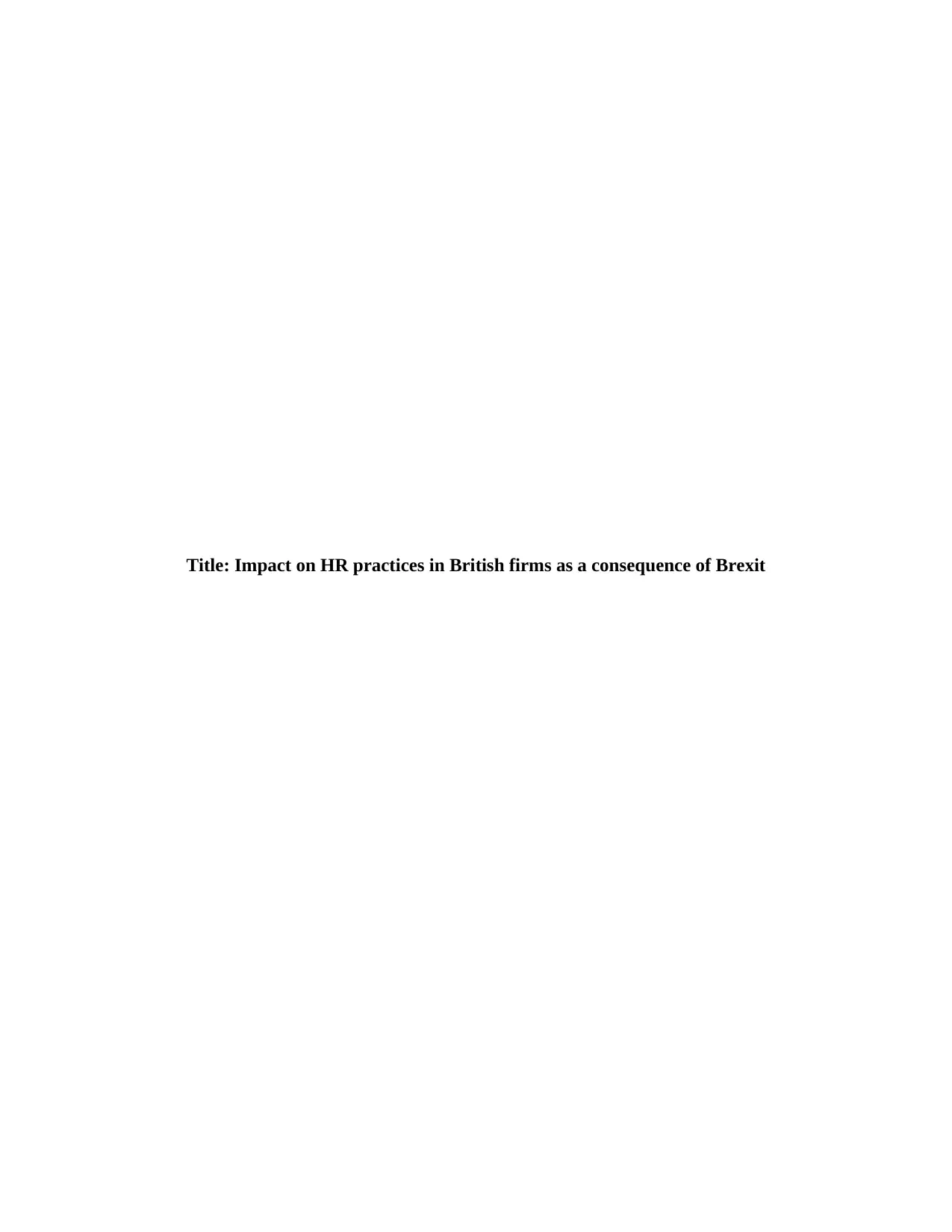
Title: Impact on HR practices in British firms as a consequence of Brexit
Paraphrase This Document
Need a fresh take? Get an instant paraphrase of this document with our AI Paraphraser
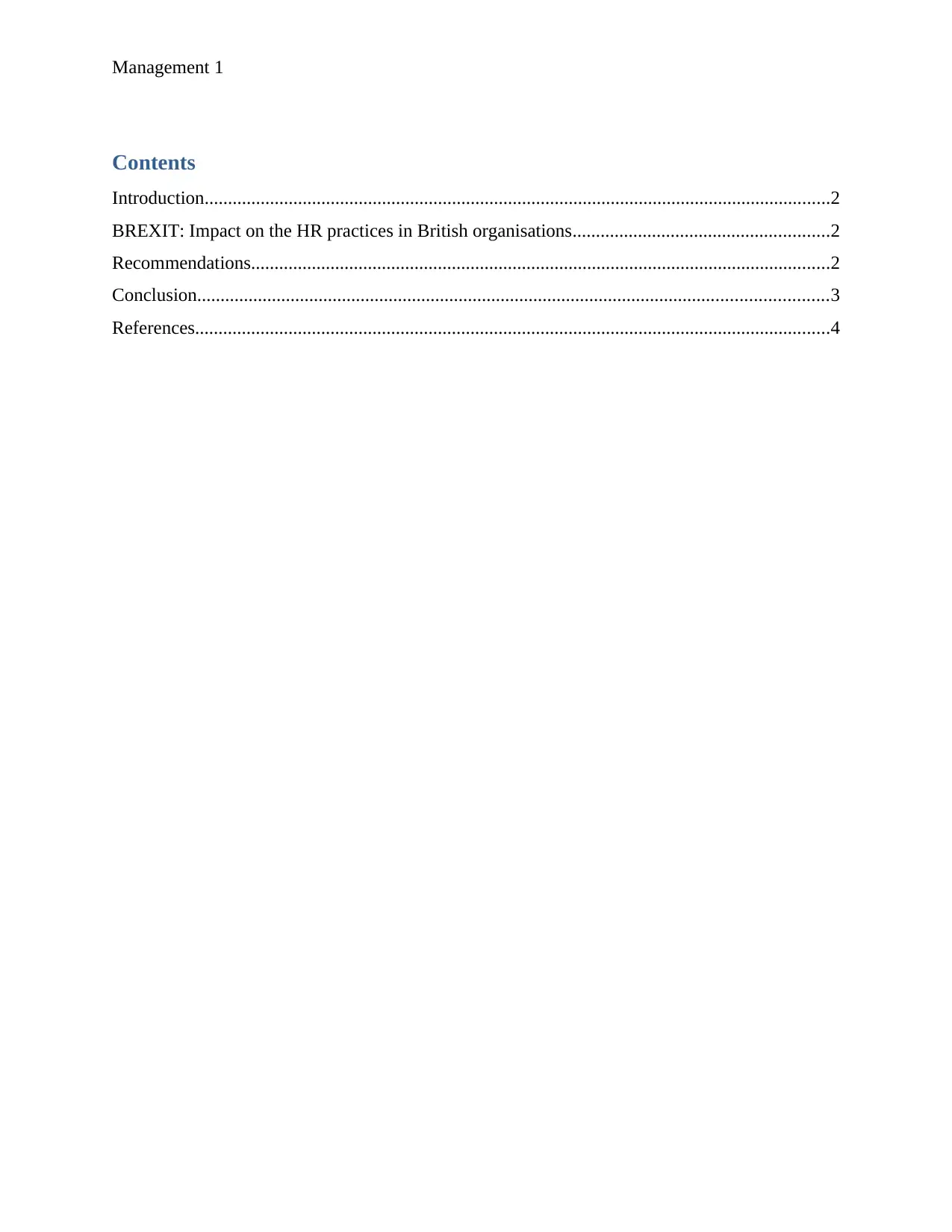
Management 1
Contents
Introduction......................................................................................................................................2
BREXIT: Impact on the HR practices in British organisations.......................................................2
Recommendations............................................................................................................................2
Conclusion.......................................................................................................................................3
References........................................................................................................................................4
Contents
Introduction......................................................................................................................................2
BREXIT: Impact on the HR practices in British organisations.......................................................2
Recommendations............................................................................................................................2
Conclusion.......................................................................................................................................3
References........................................................................................................................................4
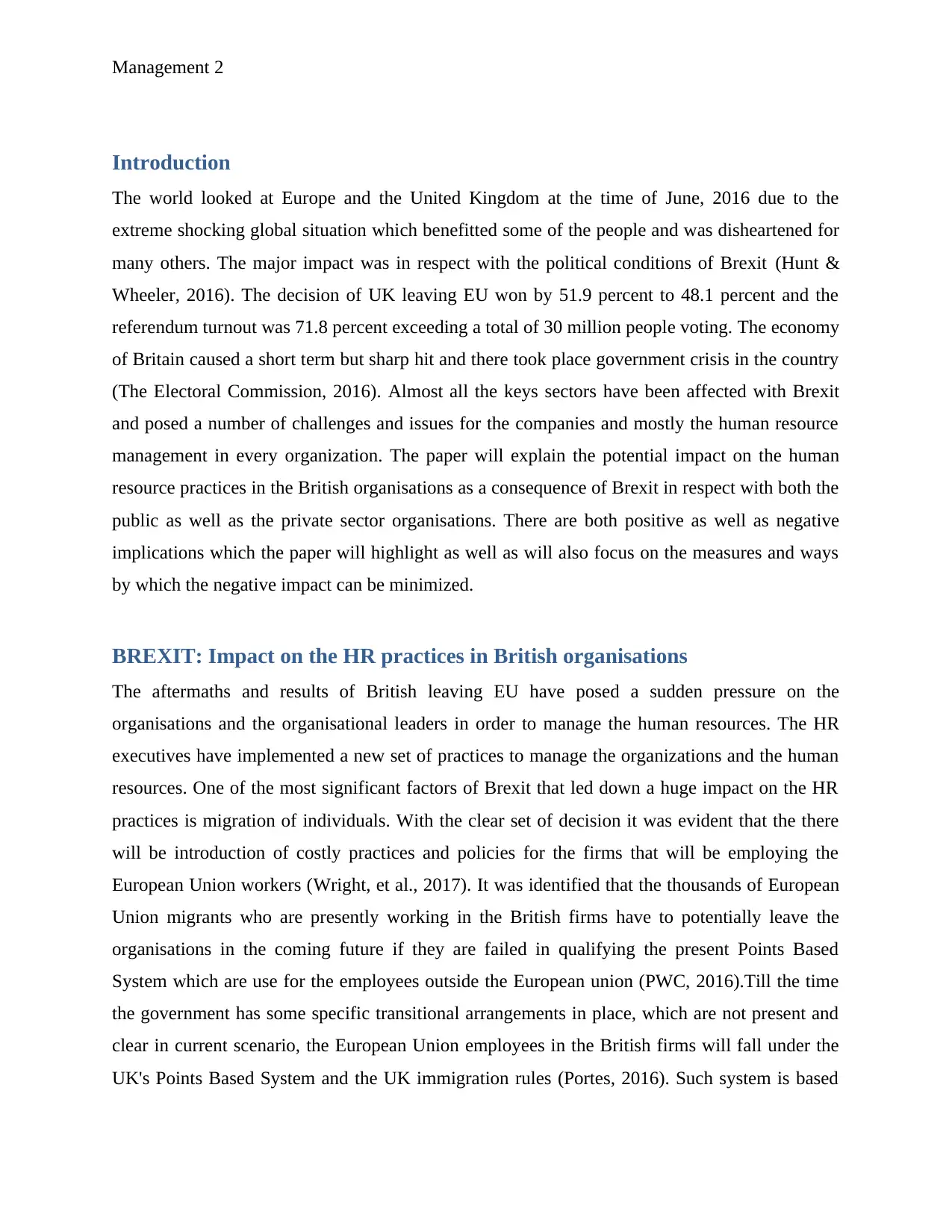
Management 2
Introduction
The world looked at Europe and the United Kingdom at the time of June, 2016 due to the
extreme shocking global situation which benefitted some of the people and was disheartened for
many others. The major impact was in respect with the political conditions of Brexit (Hunt &
Wheeler, 2016). The decision of UK leaving EU won by 51.9 percent to 48.1 percent and the
referendum turnout was 71.8 percent exceeding a total of 30 million people voting. The economy
of Britain caused a short term but sharp hit and there took place government crisis in the country
(The Electoral Commission, 2016). Almost all the keys sectors have been affected with Brexit
and posed a number of challenges and issues for the companies and mostly the human resource
management in every organization. The paper will explain the potential impact on the human
resource practices in the British organisations as a consequence of Brexit in respect with both the
public as well as the private sector organisations. There are both positive as well as negative
implications which the paper will highlight as well as will also focus on the measures and ways
by which the negative impact can be minimized.
BREXIT: Impact on the HR practices in British organisations
The aftermaths and results of British leaving EU have posed a sudden pressure on the
organisations and the organisational leaders in order to manage the human resources. The HR
executives have implemented a new set of practices to manage the organizations and the human
resources. One of the most significant factors of Brexit that led down a huge impact on the HR
practices is migration of individuals. With the clear set of decision it was evident that the there
will be introduction of costly practices and policies for the firms that will be employing the
European Union workers (Wright, et al., 2017). It was identified that the thousands of European
Union migrants who are presently working in the British firms have to potentially leave the
organisations in the coming future if they are failed in qualifying the present Points Based
System which are use for the employees outside the European union (PWC, 2016).Till the time
the government has some specific transitional arrangements in place, which are not present and
clear in current scenario, the European Union employees in the British firms will fall under the
UK's Points Based System and the UK immigration rules (Portes, 2016). Such system is based
Introduction
The world looked at Europe and the United Kingdom at the time of June, 2016 due to the
extreme shocking global situation which benefitted some of the people and was disheartened for
many others. The major impact was in respect with the political conditions of Brexit (Hunt &
Wheeler, 2016). The decision of UK leaving EU won by 51.9 percent to 48.1 percent and the
referendum turnout was 71.8 percent exceeding a total of 30 million people voting. The economy
of Britain caused a short term but sharp hit and there took place government crisis in the country
(The Electoral Commission, 2016). Almost all the keys sectors have been affected with Brexit
and posed a number of challenges and issues for the companies and mostly the human resource
management in every organization. The paper will explain the potential impact on the human
resource practices in the British organisations as a consequence of Brexit in respect with both the
public as well as the private sector organisations. There are both positive as well as negative
implications which the paper will highlight as well as will also focus on the measures and ways
by which the negative impact can be minimized.
BREXIT: Impact on the HR practices in British organisations
The aftermaths and results of British leaving EU have posed a sudden pressure on the
organisations and the organisational leaders in order to manage the human resources. The HR
executives have implemented a new set of practices to manage the organizations and the human
resources. One of the most significant factors of Brexit that led down a huge impact on the HR
practices is migration of individuals. With the clear set of decision it was evident that the there
will be introduction of costly practices and policies for the firms that will be employing the
European Union workers (Wright, et al., 2017). It was identified that the thousands of European
Union migrants who are presently working in the British firms have to potentially leave the
organisations in the coming future if they are failed in qualifying the present Points Based
System which are use for the employees outside the European union (PWC, 2016).Till the time
the government has some specific transitional arrangements in place, which are not present and
clear in current scenario, the European Union employees in the British firms will fall under the
UK's Points Based System and the UK immigration rules (Portes, 2016). Such system is based
⊘ This is a preview!⊘
Do you want full access?
Subscribe today to unlock all pages.

Trusted by 1+ million students worldwide
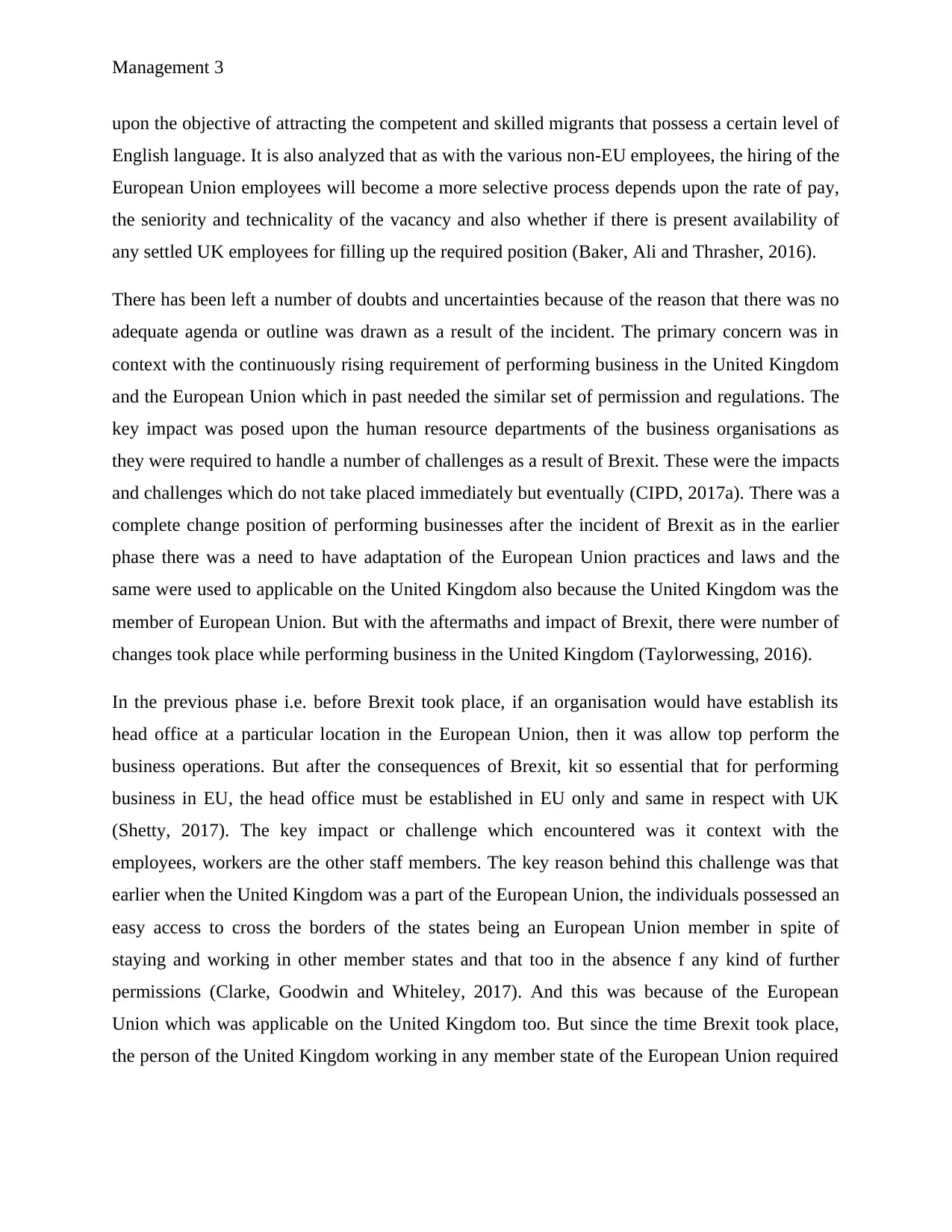
Management 3
upon the objective of attracting the competent and skilled migrants that possess a certain level of
English language. It is also analyzed that as with the various non-EU employees, the hiring of the
European Union employees will become a more selective process depends upon the rate of pay,
the seniority and technicality of the vacancy and also whether if there is present availability of
any settled UK employees for filling up the required position (Baker, Ali and Thrasher, 2016).
There has been left a number of doubts and uncertainties because of the reason that there was no
adequate agenda or outline was drawn as a result of the incident. The primary concern was in
context with the continuously rising requirement of performing business in the United Kingdom
and the European Union which in past needed the similar set of permission and regulations. The
key impact was posed upon the human resource departments of the business organisations as
they were required to handle a number of challenges as a result of Brexit. These were the impacts
and challenges which do not take placed immediately but eventually (CIPD, 2017a). There was a
complete change position of performing businesses after the incident of Brexit as in the earlier
phase there was a need to have adaptation of the European Union practices and laws and the
same were used to applicable on the United Kingdom also because the United Kingdom was the
member of European Union. But with the aftermaths and impact of Brexit, there were number of
changes took place while performing business in the United Kingdom (Taylorwessing, 2016).
In the previous phase i.e. before Brexit took place, if an organisation would have establish its
head office at a particular location in the European Union, then it was allow top perform the
business operations. But after the consequences of Brexit, kit so essential that for performing
business in EU, the head office must be established in EU only and same in respect with UK
(Shetty, 2017). The key impact or challenge which encountered was it context with the
employees, workers are the other staff members. The key reason behind this challenge was that
earlier when the United Kingdom was a part of the European Union, the individuals possessed an
easy access to cross the borders of the states being an European Union member in spite of
staying and working in other member states and that too in the absence f any kind of further
permissions (Clarke, Goodwin and Whiteley, 2017). And this was because of the European
Union which was applicable on the United Kingdom too. But since the time Brexit took place,
the person of the United Kingdom working in any member state of the European Union required
upon the objective of attracting the competent and skilled migrants that possess a certain level of
English language. It is also analyzed that as with the various non-EU employees, the hiring of the
European Union employees will become a more selective process depends upon the rate of pay,
the seniority and technicality of the vacancy and also whether if there is present availability of
any settled UK employees for filling up the required position (Baker, Ali and Thrasher, 2016).
There has been left a number of doubts and uncertainties because of the reason that there was no
adequate agenda or outline was drawn as a result of the incident. The primary concern was in
context with the continuously rising requirement of performing business in the United Kingdom
and the European Union which in past needed the similar set of permission and regulations. The
key impact was posed upon the human resource departments of the business organisations as
they were required to handle a number of challenges as a result of Brexit. These were the impacts
and challenges which do not take placed immediately but eventually (CIPD, 2017a). There was a
complete change position of performing businesses after the incident of Brexit as in the earlier
phase there was a need to have adaptation of the European Union practices and laws and the
same were used to applicable on the United Kingdom also because the United Kingdom was the
member of European Union. But with the aftermaths and impact of Brexit, there were number of
changes took place while performing business in the United Kingdom (Taylorwessing, 2016).
In the previous phase i.e. before Brexit took place, if an organisation would have establish its
head office at a particular location in the European Union, then it was allow top perform the
business operations. But after the consequences of Brexit, kit so essential that for performing
business in EU, the head office must be established in EU only and same in respect with UK
(Shetty, 2017). The key impact or challenge which encountered was it context with the
employees, workers are the other staff members. The key reason behind this challenge was that
earlier when the United Kingdom was a part of the European Union, the individuals possessed an
easy access to cross the borders of the states being an European Union member in spite of
staying and working in other member states and that too in the absence f any kind of further
permissions (Clarke, Goodwin and Whiteley, 2017). And this was because of the European
Union which was applicable on the United Kingdom too. But since the time Brexit took place,
the person of the United Kingdom working in any member state of the European Union required
Paraphrase This Document
Need a fresh take? Get an instant paraphrase of this document with our AI Paraphraser
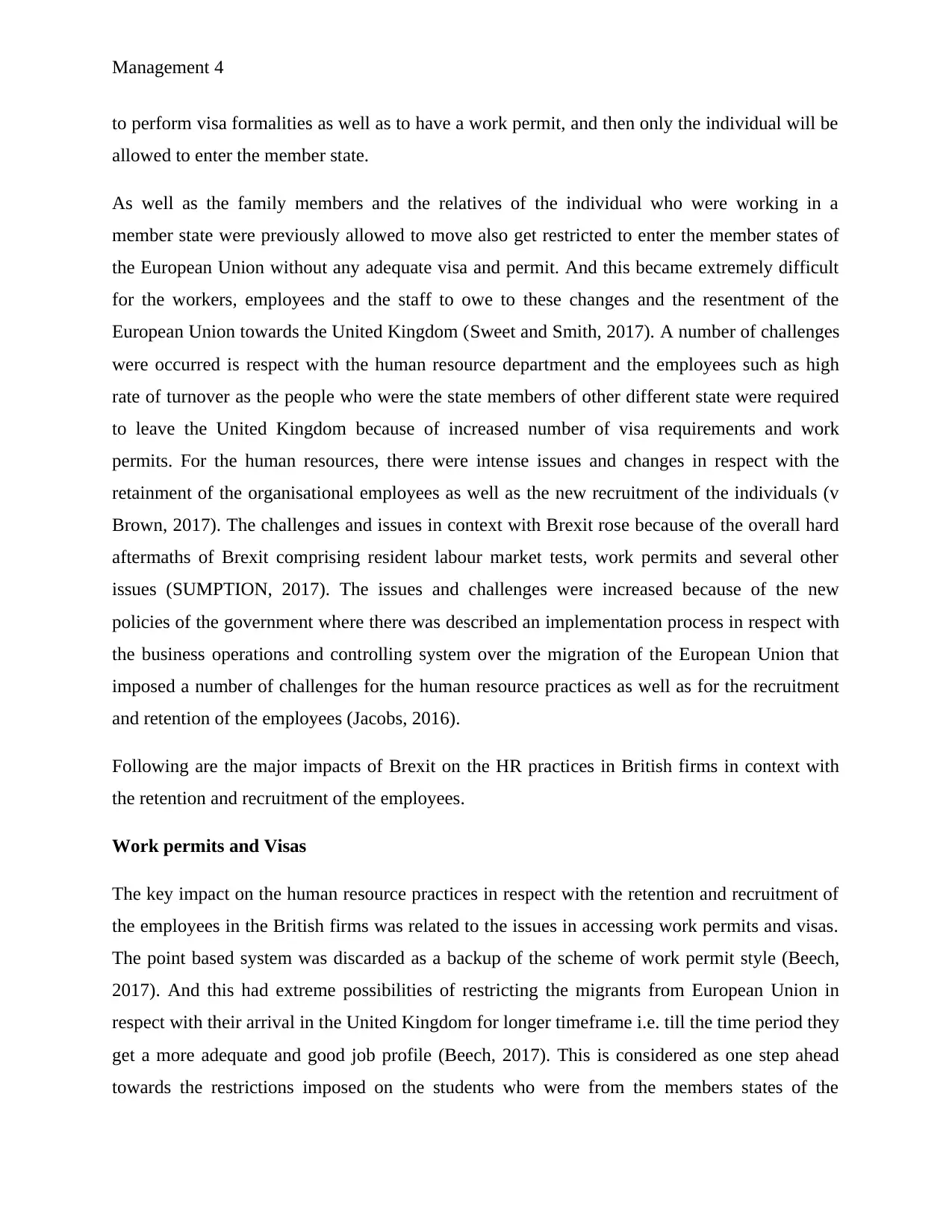
Management 4
to perform visa formalities as well as to have a work permit, and then only the individual will be
allowed to enter the member state.
As well as the family members and the relatives of the individual who were working in a
member state were previously allowed to move also get restricted to enter the member states of
the European Union without any adequate visa and permit. And this became extremely difficult
for the workers, employees and the staff to owe to these changes and the resentment of the
European Union towards the United Kingdom (Sweet and Smith, 2017). A number of challenges
were occurred is respect with the human resource department and the employees such as high
rate of turnover as the people who were the state members of other different state were required
to leave the United Kingdom because of increased number of visa requirements and work
permits. For the human resources, there were intense issues and changes in respect with the
retainment of the organisational employees as well as the new recruitment of the individuals (v
Brown, 2017). The challenges and issues in context with Brexit rose because of the overall hard
aftermaths of Brexit comprising resident labour market tests, work permits and several other
issues (SUMPTION, 2017). The issues and challenges were increased because of the new
policies of the government where there was described an implementation process in respect with
the business operations and controlling system over the migration of the European Union that
imposed a number of challenges for the human resource practices as well as for the recruitment
and retention of the employees (Jacobs, 2016).
Following are the major impacts of Brexit on the HR practices in British firms in context with
the retention and recruitment of the employees.
Work permits and Visas
The key impact on the human resource practices in respect with the retention and recruitment of
the employees in the British firms was related to the issues in accessing work permits and visas.
The point based system was discarded as a backup of the scheme of work permit style (Beech,
2017). And this had extreme possibilities of restricting the migrants from European Union in
respect with their arrival in the United Kingdom for longer timeframe i.e. till the time period they
get a more adequate and good job profile (Beech, 2017). This is considered as one step ahead
towards the restrictions imposed on the students who were from the members states of the
to perform visa formalities as well as to have a work permit, and then only the individual will be
allowed to enter the member state.
As well as the family members and the relatives of the individual who were working in a
member state were previously allowed to move also get restricted to enter the member states of
the European Union without any adequate visa and permit. And this became extremely difficult
for the workers, employees and the staff to owe to these changes and the resentment of the
European Union towards the United Kingdom (Sweet and Smith, 2017). A number of challenges
were occurred is respect with the human resource department and the employees such as high
rate of turnover as the people who were the state members of other different state were required
to leave the United Kingdom because of increased number of visa requirements and work
permits. For the human resources, there were intense issues and changes in respect with the
retainment of the organisational employees as well as the new recruitment of the individuals (v
Brown, 2017). The challenges and issues in context with Brexit rose because of the overall hard
aftermaths of Brexit comprising resident labour market tests, work permits and several other
issues (SUMPTION, 2017). The issues and challenges were increased because of the new
policies of the government where there was described an implementation process in respect with
the business operations and controlling system over the migration of the European Union that
imposed a number of challenges for the human resource practices as well as for the recruitment
and retention of the employees (Jacobs, 2016).
Following are the major impacts of Brexit on the HR practices in British firms in context with
the retention and recruitment of the employees.
Work permits and Visas
The key impact on the human resource practices in respect with the retention and recruitment of
the employees in the British firms was related to the issues in accessing work permits and visas.
The point based system was discarded as a backup of the scheme of work permit style (Beech,
2017). And this had extreme possibilities of restricting the migrants from European Union in
respect with their arrival in the United Kingdom for longer timeframe i.e. till the time period they
get a more adequate and good job profile (Beech, 2017). This is considered as one step ahead
towards the restrictions imposed on the students who were from the members states of the
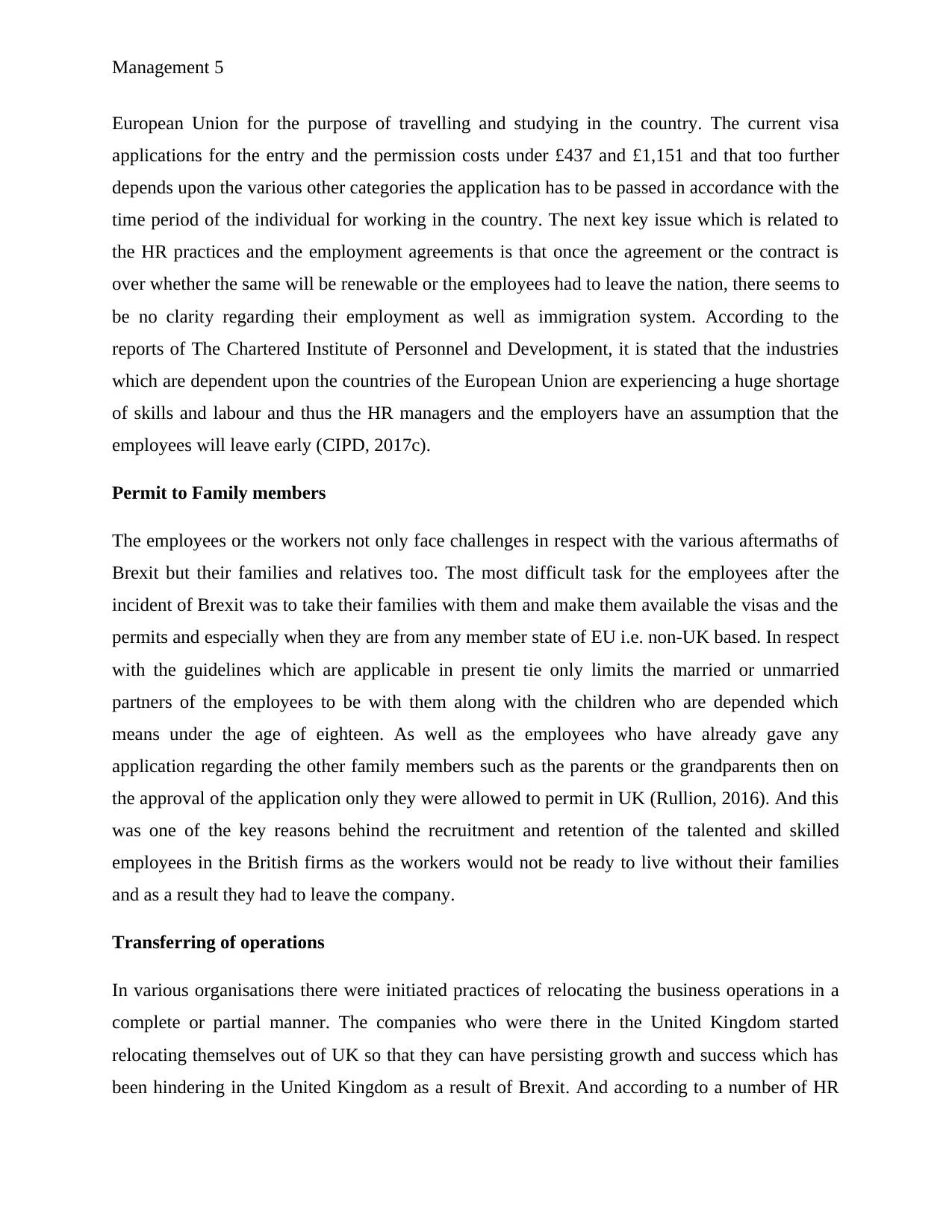
Management 5
European Union for the purpose of travelling and studying in the country. The current visa
applications for the entry and the permission costs under £437 and £1,151 and that too further
depends upon the various other categories the application has to be passed in accordance with the
time period of the individual for working in the country. The next key issue which is related to
the HR practices and the employment agreements is that once the agreement or the contract is
over whether the same will be renewable or the employees had to leave the nation, there seems to
be no clarity regarding their employment as well as immigration system. According to the
reports of The Chartered Institute of Personnel and Development, it is stated that the industries
which are dependent upon the countries of the European Union are experiencing a huge shortage
of skills and labour and thus the HR managers and the employers have an assumption that the
employees will leave early (CIPD, 2017c).
Permit to Family members
The employees or the workers not only face challenges in respect with the various aftermaths of
Brexit but their families and relatives too. The most difficult task for the employees after the
incident of Brexit was to take their families with them and make them available the visas and the
permits and especially when they are from any member state of EU i.e. non-UK based. In respect
with the guidelines which are applicable in present tie only limits the married or unmarried
partners of the employees to be with them along with the children who are depended which
means under the age of eighteen. As well as the employees who have already gave any
application regarding the other family members such as the parents or the grandparents then on
the approval of the application only they were allowed to permit in UK (Rullion, 2016). And this
was one of the key reasons behind the recruitment and retention of the talented and skilled
employees in the British firms as the workers would not be ready to live without their families
and as a result they had to leave the company.
Transferring of operations
In various organisations there were initiated practices of relocating the business operations in a
complete or partial manner. The companies who were there in the United Kingdom started
relocating themselves out of UK so that they can have persisting growth and success which has
been hindering in the United Kingdom as a result of Brexit. And according to a number of HR
European Union for the purpose of travelling and studying in the country. The current visa
applications for the entry and the permission costs under £437 and £1,151 and that too further
depends upon the various other categories the application has to be passed in accordance with the
time period of the individual for working in the country. The next key issue which is related to
the HR practices and the employment agreements is that once the agreement or the contract is
over whether the same will be renewable or the employees had to leave the nation, there seems to
be no clarity regarding their employment as well as immigration system. According to the
reports of The Chartered Institute of Personnel and Development, it is stated that the industries
which are dependent upon the countries of the European Union are experiencing a huge shortage
of skills and labour and thus the HR managers and the employers have an assumption that the
employees will leave early (CIPD, 2017c).
Permit to Family members
The employees or the workers not only face challenges in respect with the various aftermaths of
Brexit but their families and relatives too. The most difficult task for the employees after the
incident of Brexit was to take their families with them and make them available the visas and the
permits and especially when they are from any member state of EU i.e. non-UK based. In respect
with the guidelines which are applicable in present tie only limits the married or unmarried
partners of the employees to be with them along with the children who are depended which
means under the age of eighteen. As well as the employees who have already gave any
application regarding the other family members such as the parents or the grandparents then on
the approval of the application only they were allowed to permit in UK (Rullion, 2016). And this
was one of the key reasons behind the recruitment and retention of the talented and skilled
employees in the British firms as the workers would not be ready to live without their families
and as a result they had to leave the company.
Transferring of operations
In various organisations there were initiated practices of relocating the business operations in a
complete or partial manner. The companies who were there in the United Kingdom started
relocating themselves out of UK so that they can have persisting growth and success which has
been hindering in the United Kingdom as a result of Brexit. And according to a number of HR
⊘ This is a preview!⊘
Do you want full access?
Subscribe today to unlock all pages.

Trusted by 1+ million students worldwide
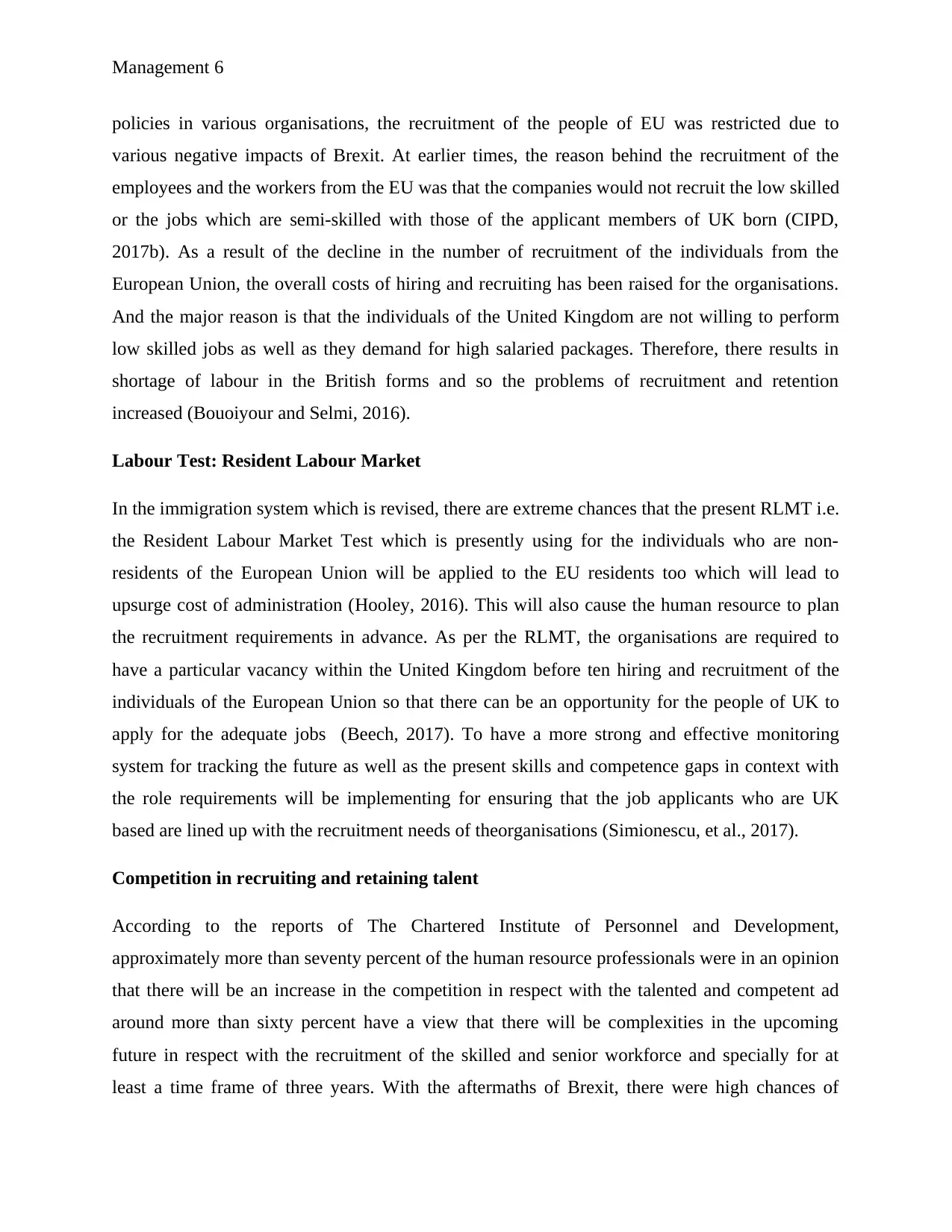
Management 6
policies in various organisations, the recruitment of the people of EU was restricted due to
various negative impacts of Brexit. At earlier times, the reason behind the recruitment of the
employees and the workers from the EU was that the companies would not recruit the low skilled
or the jobs which are semi-skilled with those of the applicant members of UK born (CIPD,
2017b). As a result of the decline in the number of recruitment of the individuals from the
European Union, the overall costs of hiring and recruiting has been raised for the organisations.
And the major reason is that the individuals of the United Kingdom are not willing to perform
low skilled jobs as well as they demand for high salaried packages. Therefore, there results in
shortage of labour in the British forms and so the problems of recruitment and retention
increased (Bouoiyour and Selmi, 2016).
Labour Test: Resident Labour Market
In the immigration system which is revised, there are extreme chances that the present RLMT i.e.
the Resident Labour Market Test which is presently using for the individuals who are non-
residents of the European Union will be applied to the EU residents too which will lead to
upsurge cost of administration (Hooley, 2016). This will also cause the human resource to plan
the recruitment requirements in advance. As per the RLMT, the organisations are required to
have a particular vacancy within the United Kingdom before ten hiring and recruitment of the
individuals of the European Union so that there can be an opportunity for the people of UK to
apply for the adequate jobs (Beech, 2017). To have a more strong and effective monitoring
system for tracking the future as well as the present skills and competence gaps in context with
the role requirements will be implementing for ensuring that the job applicants who are UK
based are lined up with the recruitment needs of theorganisations (Simionescu, et al., 2017).
Competition in recruiting and retaining talent
According to the reports of The Chartered Institute of Personnel and Development,
approximately more than seventy percent of the human resource professionals were in an opinion
that there will be an increase in the competition in respect with the talented and competent ad
around more than sixty percent have a view that there will be complexities in the upcoming
future in respect with the recruitment of the skilled and senior workforce and specially for at
least a time frame of three years. With the aftermaths of Brexit, there were high chances of
policies in various organisations, the recruitment of the people of EU was restricted due to
various negative impacts of Brexit. At earlier times, the reason behind the recruitment of the
employees and the workers from the EU was that the companies would not recruit the low skilled
or the jobs which are semi-skilled with those of the applicant members of UK born (CIPD,
2017b). As a result of the decline in the number of recruitment of the individuals from the
European Union, the overall costs of hiring and recruiting has been raised for the organisations.
And the major reason is that the individuals of the United Kingdom are not willing to perform
low skilled jobs as well as they demand for high salaried packages. Therefore, there results in
shortage of labour in the British forms and so the problems of recruitment and retention
increased (Bouoiyour and Selmi, 2016).
Labour Test: Resident Labour Market
In the immigration system which is revised, there are extreme chances that the present RLMT i.e.
the Resident Labour Market Test which is presently using for the individuals who are non-
residents of the European Union will be applied to the EU residents too which will lead to
upsurge cost of administration (Hooley, 2016). This will also cause the human resource to plan
the recruitment requirements in advance. As per the RLMT, the organisations are required to
have a particular vacancy within the United Kingdom before ten hiring and recruitment of the
individuals of the European Union so that there can be an opportunity for the people of UK to
apply for the adequate jobs (Beech, 2017). To have a more strong and effective monitoring
system for tracking the future as well as the present skills and competence gaps in context with
the role requirements will be implementing for ensuring that the job applicants who are UK
based are lined up with the recruitment needs of theorganisations (Simionescu, et al., 2017).
Competition in recruiting and retaining talent
According to the reports of The Chartered Institute of Personnel and Development,
approximately more than seventy percent of the human resource professionals were in an opinion
that there will be an increase in the competition in respect with the talented and competent ad
around more than sixty percent have a view that there will be complexities in the upcoming
future in respect with the recruitment of the skilled and senior workforce and specially for at
least a time frame of three years. With the aftermaths of Brexit, there were high chances of
Paraphrase This Document
Need a fresh take? Get an instant paraphrase of this document with our AI Paraphraser
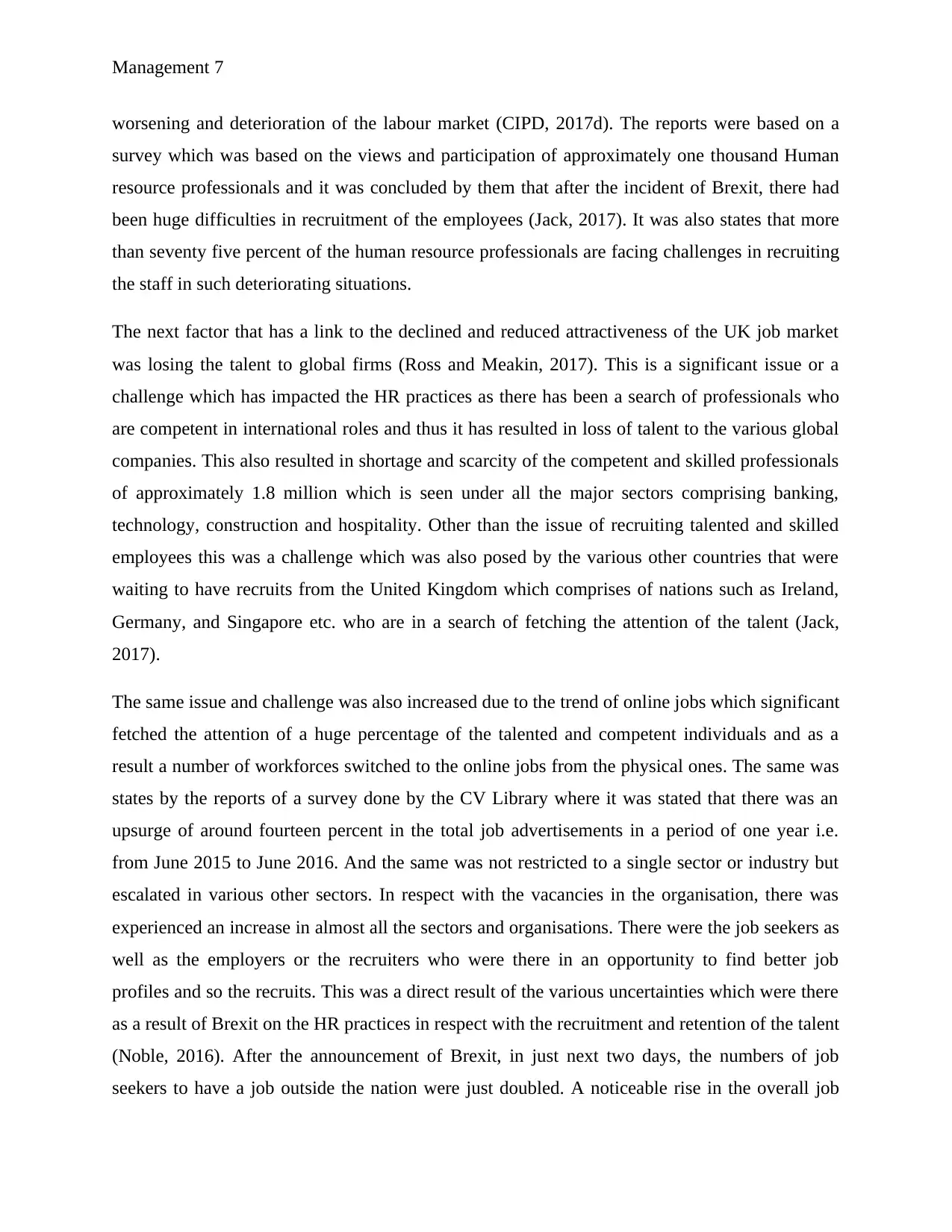
Management 7
worsening and deterioration of the labour market (CIPD, 2017d). The reports were based on a
survey which was based on the views and participation of approximately one thousand Human
resource professionals and it was concluded by them that after the incident of Brexit, there had
been huge difficulties in recruitment of the employees (Jack, 2017). It was also states that more
than seventy five percent of the human resource professionals are facing challenges in recruiting
the staff in such deteriorating situations.
The next factor that has a link to the declined and reduced attractiveness of the UK job market
was losing the talent to global firms (Ross and Meakin, 2017). This is a significant issue or a
challenge which has impacted the HR practices as there has been a search of professionals who
are competent in international roles and thus it has resulted in loss of talent to the various global
companies. This also resulted in shortage and scarcity of the competent and skilled professionals
of approximately 1.8 million which is seen under all the major sectors comprising banking,
technology, construction and hospitality. Other than the issue of recruiting talented and skilled
employees this was a challenge which was also posed by the various other countries that were
waiting to have recruits from the United Kingdom which comprises of nations such as Ireland,
Germany, and Singapore etc. who are in a search of fetching the attention of the talent (Jack,
2017).
The same issue and challenge was also increased due to the trend of online jobs which significant
fetched the attention of a huge percentage of the talented and competent individuals and as a
result a number of workforces switched to the online jobs from the physical ones. The same was
states by the reports of a survey done by the CV Library where it was stated that there was an
upsurge of around fourteen percent in the total job advertisements in a period of one year i.e.
from June 2015 to June 2016. And the same was not restricted to a single sector or industry but
escalated in various other sectors. In respect with the vacancies in the organisation, there was
experienced an increase in almost all the sectors and organisations. There were the job seekers as
well as the employers or the recruiters who were there in an opportunity to find better job
profiles and so the recruits. This was a direct result of the various uncertainties which were there
as a result of Brexit on the HR practices in respect with the recruitment and retention of the talent
(Noble, 2016). After the announcement of Brexit, in just next two days, the numbers of job
seekers to have a job outside the nation were just doubled. A noticeable rise in the overall job
worsening and deterioration of the labour market (CIPD, 2017d). The reports were based on a
survey which was based on the views and participation of approximately one thousand Human
resource professionals and it was concluded by them that after the incident of Brexit, there had
been huge difficulties in recruitment of the employees (Jack, 2017). It was also states that more
than seventy five percent of the human resource professionals are facing challenges in recruiting
the staff in such deteriorating situations.
The next factor that has a link to the declined and reduced attractiveness of the UK job market
was losing the talent to global firms (Ross and Meakin, 2017). This is a significant issue or a
challenge which has impacted the HR practices as there has been a search of professionals who
are competent in international roles and thus it has resulted in loss of talent to the various global
companies. This also resulted in shortage and scarcity of the competent and skilled professionals
of approximately 1.8 million which is seen under all the major sectors comprising banking,
technology, construction and hospitality. Other than the issue of recruiting talented and skilled
employees this was a challenge which was also posed by the various other countries that were
waiting to have recruits from the United Kingdom which comprises of nations such as Ireland,
Germany, and Singapore etc. who are in a search of fetching the attention of the talent (Jack,
2017).
The same issue and challenge was also increased due to the trend of online jobs which significant
fetched the attention of a huge percentage of the talented and competent individuals and as a
result a number of workforces switched to the online jobs from the physical ones. The same was
states by the reports of a survey done by the CV Library where it was stated that there was an
upsurge of around fourteen percent in the total job advertisements in a period of one year i.e.
from June 2015 to June 2016. And the same was not restricted to a single sector or industry but
escalated in various other sectors. In respect with the vacancies in the organisation, there was
experienced an increase in almost all the sectors and organisations. There were the job seekers as
well as the employers or the recruiters who were there in an opportunity to find better job
profiles and so the recruits. This was a direct result of the various uncertainties which were there
as a result of Brexit on the HR practices in respect with the recruitment and retention of the talent
(Noble, 2016). After the announcement of Brexit, in just next two days, the numbers of job
seekers to have a job outside the nation were just doubled. A noticeable rise in the overall job
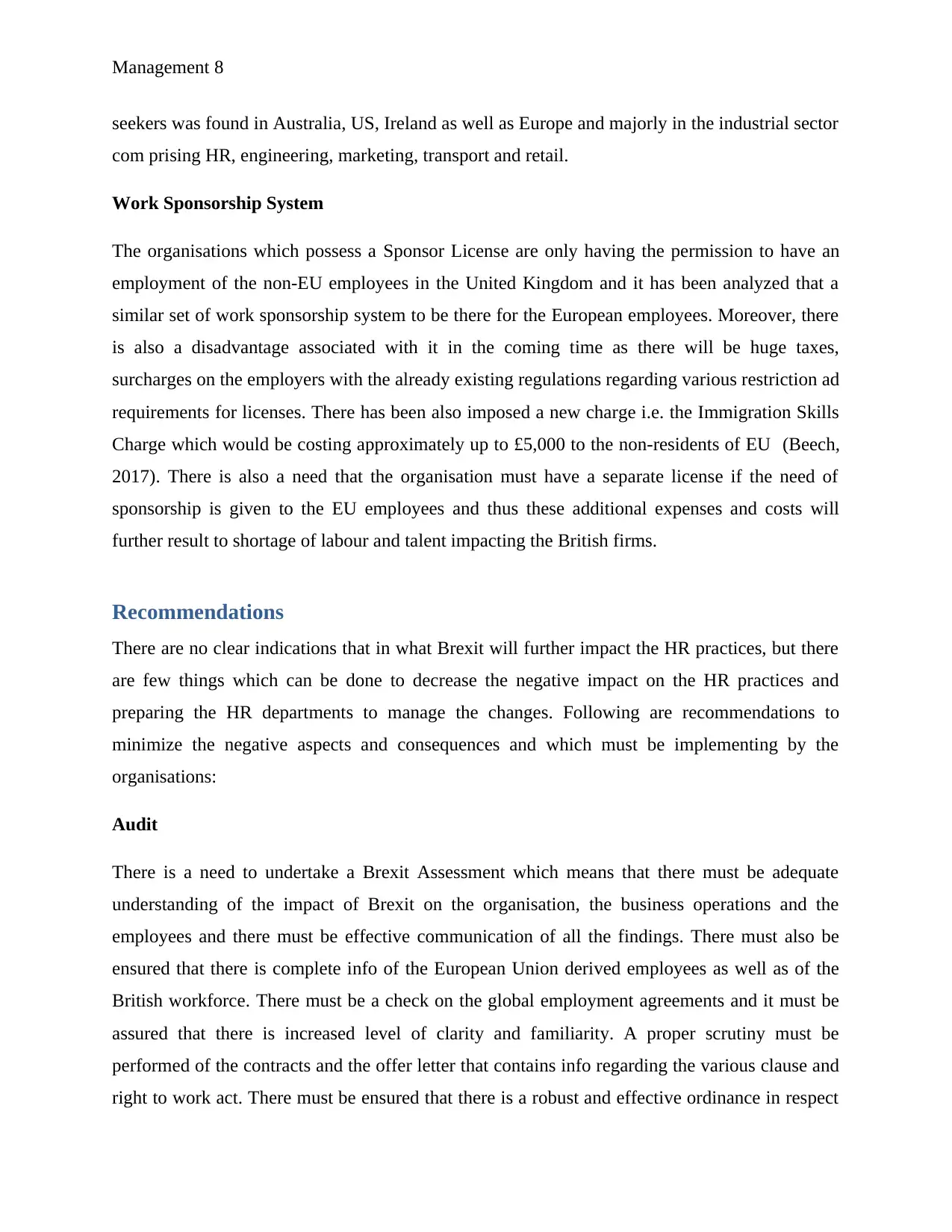
Management 8
seekers was found in Australia, US, Ireland as well as Europe and majorly in the industrial sector
com prising HR, engineering, marketing, transport and retail.
Work Sponsorship System
The organisations which possess a Sponsor License are only having the permission to have an
employment of the non-EU employees in the United Kingdom and it has been analyzed that a
similar set of work sponsorship system to be there for the European employees. Moreover, there
is also a disadvantage associated with it in the coming time as there will be huge taxes,
surcharges on the employers with the already existing regulations regarding various restriction ad
requirements for licenses. There has been also imposed a new charge i.e. the Immigration Skills
Charge which would be costing approximately up to £5,000 to the non-residents of EU (Beech,
2017). There is also a need that the organisation must have a separate license if the need of
sponsorship is given to the EU employees and thus these additional expenses and costs will
further result to shortage of labour and talent impacting the British firms.
Recommendations
There are no clear indications that in what Brexit will further impact the HR practices, but there
are few things which can be done to decrease the negative impact on the HR practices and
preparing the HR departments to manage the changes. Following are recommendations to
minimize the negative aspects and consequences and which must be implementing by the
organisations:
Audit
There is a need to undertake a Brexit Assessment which means that there must be adequate
understanding of the impact of Brexit on the organisation, the business operations and the
employees and there must be effective communication of all the findings. There must also be
ensured that there is complete info of the European Union derived employees as well as of the
British workforce. There must be a check on the global employment agreements and it must be
assured that there is increased level of clarity and familiarity. A proper scrutiny must be
performed of the contracts and the offer letter that contains info regarding the various clause and
right to work act. There must be ensured that there is a robust and effective ordinance in respect
seekers was found in Australia, US, Ireland as well as Europe and majorly in the industrial sector
com prising HR, engineering, marketing, transport and retail.
Work Sponsorship System
The organisations which possess a Sponsor License are only having the permission to have an
employment of the non-EU employees in the United Kingdom and it has been analyzed that a
similar set of work sponsorship system to be there for the European employees. Moreover, there
is also a disadvantage associated with it in the coming time as there will be huge taxes,
surcharges on the employers with the already existing regulations regarding various restriction ad
requirements for licenses. There has been also imposed a new charge i.e. the Immigration Skills
Charge which would be costing approximately up to £5,000 to the non-residents of EU (Beech,
2017). There is also a need that the organisation must have a separate license if the need of
sponsorship is given to the EU employees and thus these additional expenses and costs will
further result to shortage of labour and talent impacting the British firms.
Recommendations
There are no clear indications that in what Brexit will further impact the HR practices, but there
are few things which can be done to decrease the negative impact on the HR practices and
preparing the HR departments to manage the changes. Following are recommendations to
minimize the negative aspects and consequences and which must be implementing by the
organisations:
Audit
There is a need to undertake a Brexit Assessment which means that there must be adequate
understanding of the impact of Brexit on the organisation, the business operations and the
employees and there must be effective communication of all the findings. There must also be
ensured that there is complete info of the European Union derived employees as well as of the
British workforce. There must be a check on the global employment agreements and it must be
assured that there is increased level of clarity and familiarity. A proper scrutiny must be
performed of the contracts and the offer letter that contains info regarding the various clause and
right to work act. There must be ensured that there is a robust and effective ordinance in respect
⊘ This is a preview!⊘
Do you want full access?
Subscribe today to unlock all pages.

Trusted by 1+ million students worldwide
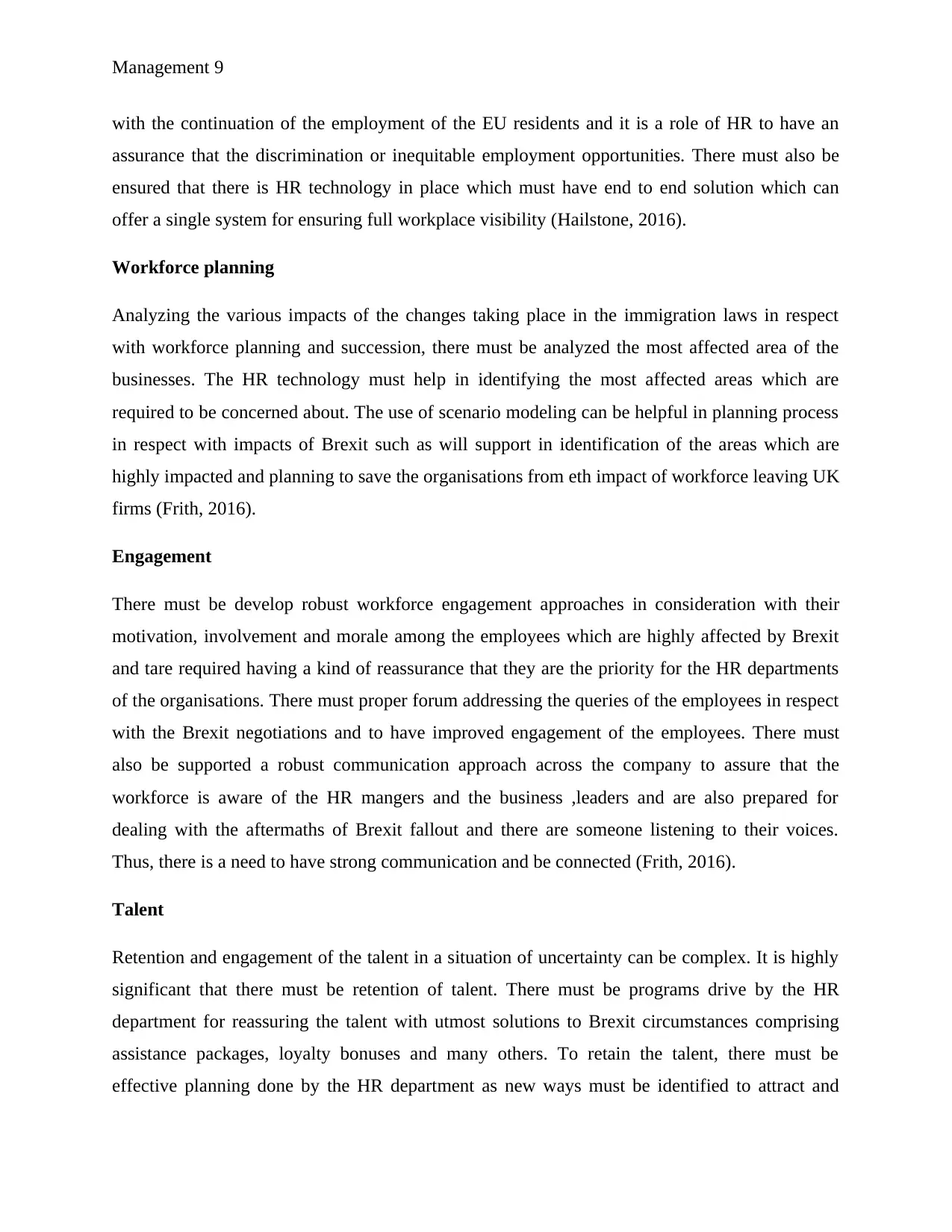
Management 9
with the continuation of the employment of the EU residents and it is a role of HR to have an
assurance that the discrimination or inequitable employment opportunities. There must also be
ensured that there is HR technology in place which must have end to end solution which can
offer a single system for ensuring full workplace visibility (Hailstone, 2016).
Workforce planning
Analyzing the various impacts of the changes taking place in the immigration laws in respect
with workforce planning and succession, there must be analyzed the most affected area of the
businesses. The HR technology must help in identifying the most affected areas which are
required to be concerned about. The use of scenario modeling can be helpful in planning process
in respect with impacts of Brexit such as will support in identification of the areas which are
highly impacted and planning to save the organisations from eth impact of workforce leaving UK
firms (Frith, 2016).
Engagement
There must be develop robust workforce engagement approaches in consideration with their
motivation, involvement and morale among the employees which are highly affected by Brexit
and tare required having a kind of reassurance that they are the priority for the HR departments
of the organisations. There must proper forum addressing the queries of the employees in respect
with the Brexit negotiations and to have improved engagement of the employees. There must
also be supported a robust communication approach across the company to assure that the
workforce is aware of the HR mangers and the business ,leaders and are also prepared for
dealing with the aftermaths of Brexit fallout and there are someone listening to their voices.
Thus, there is a need to have strong communication and be connected (Frith, 2016).
Talent
Retention and engagement of the talent in a situation of uncertainty can be complex. It is highly
significant that there must be retention of talent. There must be programs drive by the HR
department for reassuring the talent with utmost solutions to Brexit circumstances comprising
assistance packages, loyalty bonuses and many others. To retain the talent, there must be
effective planning done by the HR department as new ways must be identified to attract and
with the continuation of the employment of the EU residents and it is a role of HR to have an
assurance that the discrimination or inequitable employment opportunities. There must also be
ensured that there is HR technology in place which must have end to end solution which can
offer a single system for ensuring full workplace visibility (Hailstone, 2016).
Workforce planning
Analyzing the various impacts of the changes taking place in the immigration laws in respect
with workforce planning and succession, there must be analyzed the most affected area of the
businesses. The HR technology must help in identifying the most affected areas which are
required to be concerned about. The use of scenario modeling can be helpful in planning process
in respect with impacts of Brexit such as will support in identification of the areas which are
highly impacted and planning to save the organisations from eth impact of workforce leaving UK
firms (Frith, 2016).
Engagement
There must be develop robust workforce engagement approaches in consideration with their
motivation, involvement and morale among the employees which are highly affected by Brexit
and tare required having a kind of reassurance that they are the priority for the HR departments
of the organisations. There must proper forum addressing the queries of the employees in respect
with the Brexit negotiations and to have improved engagement of the employees. There must
also be supported a robust communication approach across the company to assure that the
workforce is aware of the HR mangers and the business ,leaders and are also prepared for
dealing with the aftermaths of Brexit fallout and there are someone listening to their voices.
Thus, there is a need to have strong communication and be connected (Frith, 2016).
Talent
Retention and engagement of the talent in a situation of uncertainty can be complex. It is highly
significant that there must be retention of talent. There must be programs drive by the HR
department for reassuring the talent with utmost solutions to Brexit circumstances comprising
assistance packages, loyalty bonuses and many others. To retain the talent, there must be
effective planning done by the HR department as new ways must be identified to attract and
Paraphrase This Document
Need a fresh take? Get an instant paraphrase of this document with our AI Paraphraser
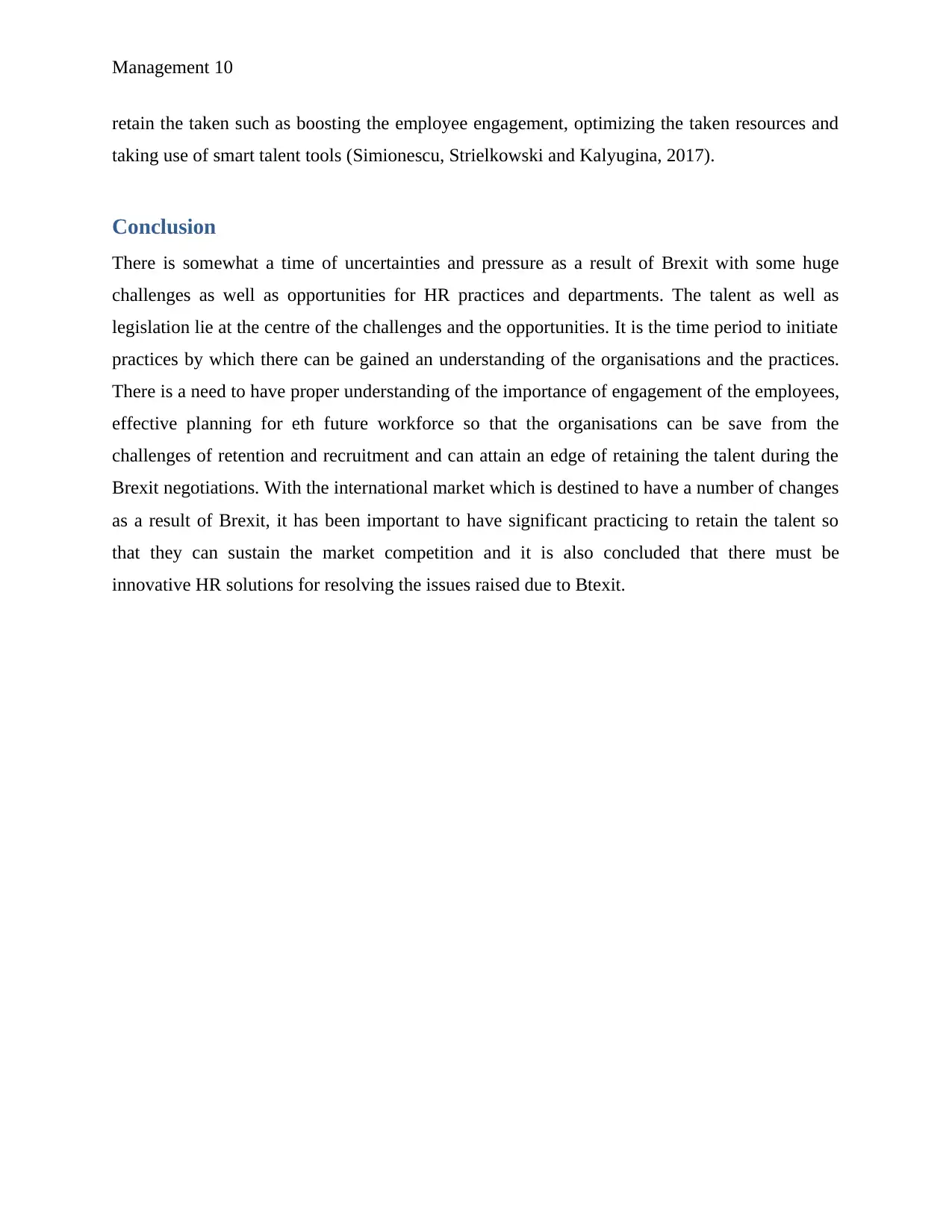
Management 10
retain the taken such as boosting the employee engagement, optimizing the taken resources and
taking use of smart talent tools (Simionescu, Strielkowski and Kalyugina, 2017).
Conclusion
There is somewhat a time of uncertainties and pressure as a result of Brexit with some huge
challenges as well as opportunities for HR practices and departments. The talent as well as
legislation lie at the centre of the challenges and the opportunities. It is the time period to initiate
practices by which there can be gained an understanding of the organisations and the practices.
There is a need to have proper understanding of the importance of engagement of the employees,
effective planning for eth future workforce so that the organisations can be save from the
challenges of retention and recruitment and can attain an edge of retaining the talent during the
Brexit negotiations. With the international market which is destined to have a number of changes
as a result of Brexit, it has been important to have significant practicing to retain the talent so
that they can sustain the market competition and it is also concluded that there must be
innovative HR solutions for resolving the issues raised due to Btexit.
retain the taken such as boosting the employee engagement, optimizing the taken resources and
taking use of smart talent tools (Simionescu, Strielkowski and Kalyugina, 2017).
Conclusion
There is somewhat a time of uncertainties and pressure as a result of Brexit with some huge
challenges as well as opportunities for HR practices and departments. The talent as well as
legislation lie at the centre of the challenges and the opportunities. It is the time period to initiate
practices by which there can be gained an understanding of the organisations and the practices.
There is a need to have proper understanding of the importance of engagement of the employees,
effective planning for eth future workforce so that the organisations can be save from the
challenges of retention and recruitment and can attain an edge of retaining the talent during the
Brexit negotiations. With the international market which is destined to have a number of changes
as a result of Brexit, it has been important to have significant practicing to retain the talent so
that they can sustain the market competition and it is also concluded that there must be
innovative HR solutions for resolving the issues raised due to Btexit.
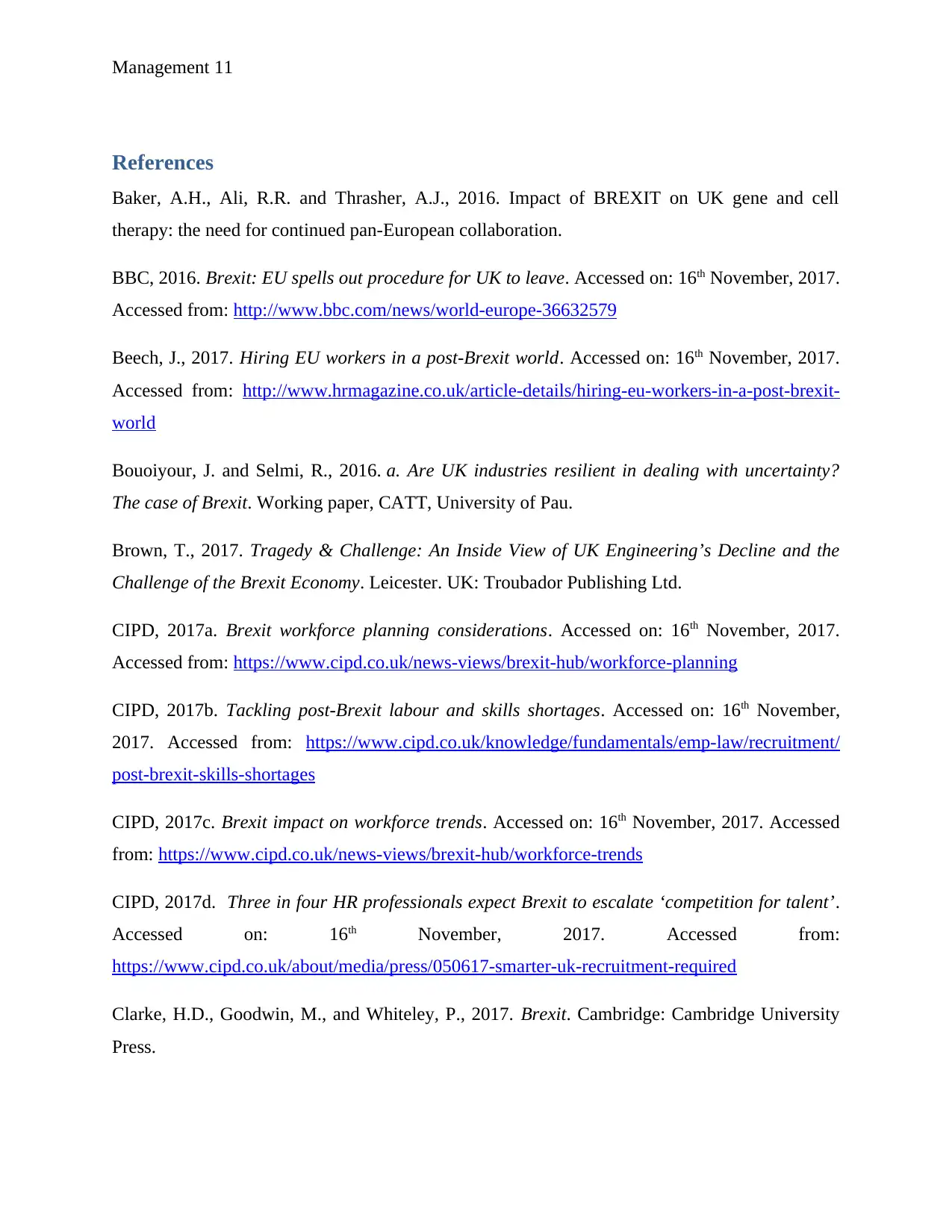
Management 11
References
Baker, A.H., Ali, R.R. and Thrasher, A.J., 2016. Impact of BREXIT on UK gene and cell
therapy: the need for continued pan-European collaboration.
BBC, 2016. Brexit: EU spells out procedure for UK to leave. Accessed on: 16th November, 2017.
Accessed from: http://www.bbc.com/news/world-europe-36632579
Beech, J., 2017. Hiring EU workers in a post-Brexit world. Accessed on: 16th November, 2017.
Accessed from: http://www.hrmagazine.co.uk/article-details/hiring-eu-workers-in-a-post-brexit-
world
Bouoiyour, J. and Selmi, R., 2016. a. Are UK industries resilient in dealing with uncertainty?
The case of Brexit. Working paper, CATT, University of Pau.
Brown, T., 2017. Tragedy & Challenge: An Inside View of UK Engineering’s Decline and the
Challenge of the Brexit Economy. Leicester. UK: Troubador Publishing Ltd.
CIPD, 2017a. Brexit workforce planning considerations. Accessed on: 16th November, 2017.
Accessed from: https://www.cipd.co.uk/news-views/brexit-hub/workforce-planning
CIPD, 2017b. Tackling post-Brexit labour and skills shortages. Accessed on: 16th November,
2017. Accessed from: https://www.cipd.co.uk/knowledge/fundamentals/emp-law/recruitment/
post-brexit-skills-shortages
CIPD, 2017c. Brexit impact on workforce trends. Accessed on: 16th November, 2017. Accessed
from: https://www.cipd.co.uk/news-views/brexit-hub/workforce-trends
CIPD, 2017d. Three in four HR professionals expect Brexit to escalate ‘competition for talent’.
Accessed on: 16th November, 2017. Accessed from:
https://www.cipd.co.uk/about/media/press/050617-smarter-uk-recruitment-required
Clarke, H.D., Goodwin, M., and Whiteley, P., 2017. Brexit. Cambridge: Cambridge University
Press.
References
Baker, A.H., Ali, R.R. and Thrasher, A.J., 2016. Impact of BREXIT on UK gene and cell
therapy: the need for continued pan-European collaboration.
BBC, 2016. Brexit: EU spells out procedure for UK to leave. Accessed on: 16th November, 2017.
Accessed from: http://www.bbc.com/news/world-europe-36632579
Beech, J., 2017. Hiring EU workers in a post-Brexit world. Accessed on: 16th November, 2017.
Accessed from: http://www.hrmagazine.co.uk/article-details/hiring-eu-workers-in-a-post-brexit-
world
Bouoiyour, J. and Selmi, R., 2016. a. Are UK industries resilient in dealing with uncertainty?
The case of Brexit. Working paper, CATT, University of Pau.
Brown, T., 2017. Tragedy & Challenge: An Inside View of UK Engineering’s Decline and the
Challenge of the Brexit Economy. Leicester. UK: Troubador Publishing Ltd.
CIPD, 2017a. Brexit workforce planning considerations. Accessed on: 16th November, 2017.
Accessed from: https://www.cipd.co.uk/news-views/brexit-hub/workforce-planning
CIPD, 2017b. Tackling post-Brexit labour and skills shortages. Accessed on: 16th November,
2017. Accessed from: https://www.cipd.co.uk/knowledge/fundamentals/emp-law/recruitment/
post-brexit-skills-shortages
CIPD, 2017c. Brexit impact on workforce trends. Accessed on: 16th November, 2017. Accessed
from: https://www.cipd.co.uk/news-views/brexit-hub/workforce-trends
CIPD, 2017d. Three in four HR professionals expect Brexit to escalate ‘competition for talent’.
Accessed on: 16th November, 2017. Accessed from:
https://www.cipd.co.uk/about/media/press/050617-smarter-uk-recruitment-required
Clarke, H.D., Goodwin, M., and Whiteley, P., 2017. Brexit. Cambridge: Cambridge University
Press.
⊘ This is a preview!⊘
Do you want full access?
Subscribe today to unlock all pages.

Trusted by 1+ million students worldwide
1 out of 15
Related Documents
Your All-in-One AI-Powered Toolkit for Academic Success.
+13062052269
info@desklib.com
Available 24*7 on WhatsApp / Email
![[object Object]](/_next/static/media/star-bottom.7253800d.svg)
Unlock your academic potential
Copyright © 2020–2026 A2Z Services. All Rights Reserved. Developed and managed by ZUCOL.





